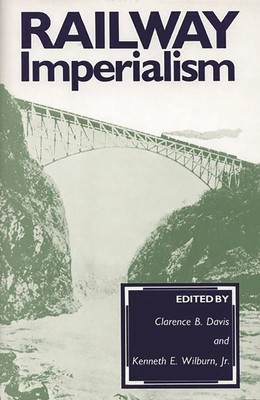
- Išsiųsime per 10–14 d.d.
- Leidėjas: Praeger
- Metai: 1991
- ISBN-10: 0313259666
- ISBN-13: 9780313259661
- Formatas: 15.6 x 23.4 x 1.6 cm, kieti viršeliai
- Kalba: Anglų
- Extra -20 % nuolaida šiai knygai su kodu ENG20
Railway Imperialism + nemokamas atvežimas! | knygos.lt
Atsiliepimai
Aprašymas
This contributed volume explores the relationship between imperialism, railways, and informal empire. Contributors account for the origins of main lines in several independent and self-governing countries. The essays reflect on the imperial and anti-imperial effects of railways, whose rails traced the divergent paths of expanding capitalism, imperial strategy, and modernizing nationalism. The reader is thereby offered an opportunity of seeing the slippery notion of informal empire in operation, and of testing its validity. The railway has often been studied from the standpoint of imperialism; this book makes a beginning with studying imperialism from the standpoint of the railway.
Following the book's introduction, which explains the imperial model considered in each chapter case study, the book opens with essays on railway imperialism in Canada, South Africa, Central Africa, Argentina, Mexico, the Indian States, Thailand, Russia and China. The last essay, written by Ronald E. Robinson, ties the book together with an engaging analysis of railway imperialism. This book should appeal to researchers and students interested in the history of imperialism and the history of railways.
EXTRA 20 % nuolaida
Kupono kodas: ENG20
Akcija baigiasi už 2d.02:28:16
Nuolaidos kodas galioja perkant nuo 10 €. Nuolaidos nesumuojamos.

- Leidėjas: Praeger
- Metai: 1991
- ISBN-10: 0313259666
- ISBN-13: 9780313259661
- Formatas: 15.6 x 23.4 x 1.6 cm, kieti viršeliai
- Kalba: Anglų
This contributed volume explores the relationship between imperialism, railways, and informal empire. Contributors account for the origins of main lines in several independent and self-governing countries. The essays reflect on the imperial and anti-imperial effects of railways, whose rails traced the divergent paths of expanding capitalism, imperial strategy, and modernizing nationalism. The reader is thereby offered an opportunity of seeing the slippery notion of informal empire in operation, and of testing its validity. The railway has often been studied from the standpoint of imperialism; this book makes a beginning with studying imperialism from the standpoint of the railway.
Following the book's introduction, which explains the imperial model considered in each chapter case study, the book opens with essays on railway imperialism in Canada, South Africa, Central Africa, Argentina, Mexico, the Indian States, Thailand, Russia and China. The last essay, written by Ronald E. Robinson, ties the book together with an engaging analysis of railway imperialism. This book should appeal to researchers and students interested in the history of imperialism and the history of railways.




Atsiliepimai